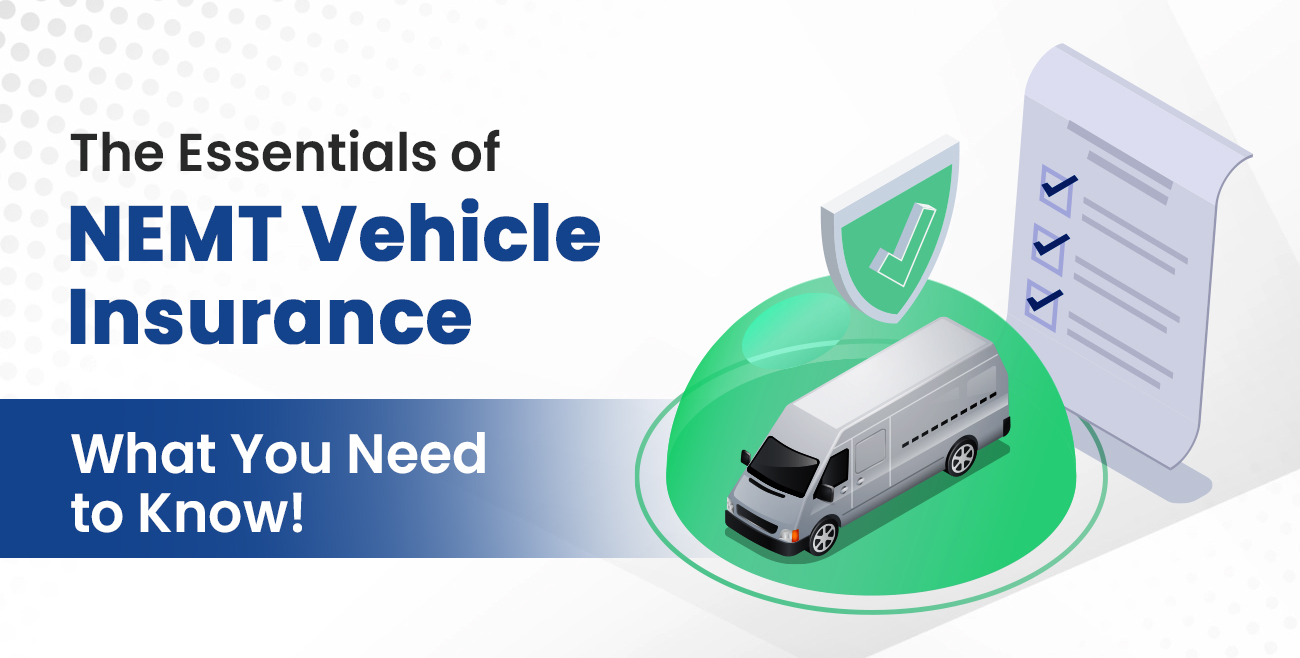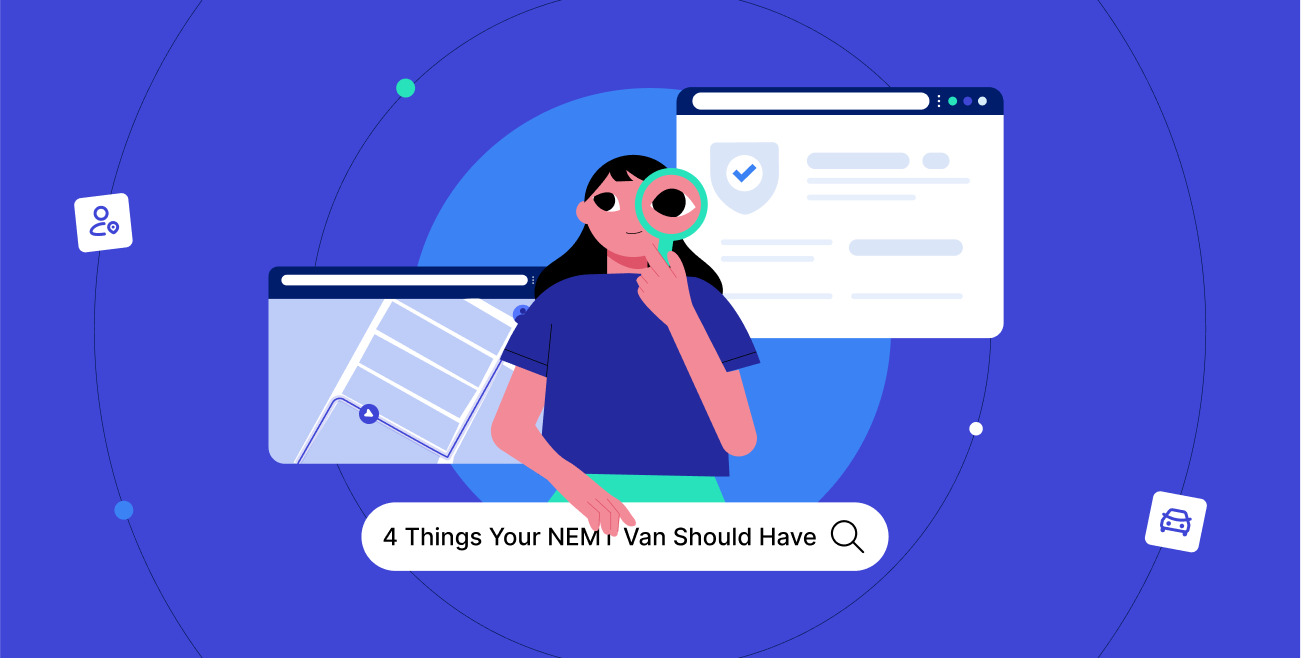
Table of Contents
Insurance is a legal mandate and an essential failsafe for your non-emergency medical transportation (NEMT) fleet, as it provides financial protection from potential liability. It can be one of the critical factors in becoming a successful NEMT provider.
Moreover, many states have specific insurance requirements for NEMT companies, making it crucial to work with reputable providers to obtain the required coverage.
This article discusses the importance of NEMT vehicle insurance, explains the different forms of insurance, and provides general guidelines on picking the right insurer and coverage.
Do More with Less
Handle more trips with fewer dispatchers on your payroll with Tobi.
Request a DemoInsurance as a Compliance Mandate
Complying with insurance regulations is crucial to ensure the safety of your clients, protect your business’s reputation and credibility, and avoid penalties and fines.
It ensures that your NEMT business operates legally and ethically while providing a safety net for your vehicles and drivers.
Insurance is State-Specific
In addition to federal laws and insurance requirements, each state has regulations for NEMT providers, similar to the ADA compliance mandate states enforce.
Some states require NEMT providers to carry specific types of insurance coverage, like commercial auto or professional liability insurance. Others need NEMT providers to have higher liability limits than standard commercial vehicles.
You must know and comply with state-specific insurance requirements in the areas where your business operates.
Evolving Insurance Landscape
The NEMT industry is constantly evolving, and so are NEMT insurance regulations. Another driver of regulatory change in the industry is the emergence of new technologies and transportation models.
Staying informed about regulatory changes is one of the best ways to ensure compliance with state rules. Keep up to date with changes to existing laws and be aware of new laws or regulations that may be under discussion.
Regularly reviewing your insurance coverage is essential to ensure it meets your state’s requirements.
NEMT Vehicle Insurance Coverage Options
Providers have several coverage options to consider when thinking about NEMT vehicle insurance.
Auto Liability Insurance
This type of insurance is mandatory for your NEMT company and covers damages from accidents caused by your drivers.
Liability insurance covers legal defense costs, settlements, and the injured party’s medical expenses.
Without liability insurance, your NEMT company cannot legally operate.
General Liability Insurance
This level of coverage enhances the protective sphere of an NEMT provider.
It addresses injuries that clients or other third parties might sustain during the provision of services, as well as property damages that don’t involve vehicles.
Its primary objective is to protect against potential claims arising from services or operations.
However, this insurance does not cover claims from vehicular accidents or errors in professional services.
Professional Liability Insurance
This type of business insurance for NEMT acknowledges that mistakes can happen even with stringent measures in place.
It provides a safety net for NEMT providers by covering claims arising from errors, omissions, or any negligence in the services rendered.
It’s worth noting, however, that intentional malpractices or fraudulent claims fall outside its coverage.
Collision Insurance
Collision insurance covers damages to your NEMT vehicles resulting from a collision.
It covers vehicle repairs or replacement and related expenses, such as towing.
Collision insurance can be helpful, protecting your assets and ensuring you can continue to provide transportation services if one of your vans is in an accident.
Comprehensive Insurance
Comprehensive insurance covers damage to NEMT vehicles caused by natural disasters, theft, vandalism, or other non-collision events.
It can minimize expenses, like paying for replacement rental vehicles while your vans are out of commission.
Comprehensive insurance can be vital for your NEMT business to minimize the financial impact of emergencies and natural disasters.
Uninsured Motorist Coverage
Uninsured motorist coverage protects your company and passengers in case of an accident with someone who doesn’t have auto liability insurance.
It can help pay for medical expenses, lost earnings, and other damages you would otherwise have to pay for.
Medical Payment Coverage
Medical payment insurance provides coverage specifically for the medical expenses of drivers and passengers in the event of an accident.
It can cover medical treatments, hospital stays, lost wages, rehabilitation, and related costs.
If your fleet transports passengers with medical conditions or special needs, you can significantly benefit from having medical payment coverage.
Personal Injury Protection (PIP)
Like medical payment coverage, you can use personal injury protection to pay for medical expenses resulting from an accident.
However, PIP extends beyond medical expenses and covers additional costs resulting from injuries sustained in the accident, such as lost income or childcare expenses.
If the cost of essential medical care surpasses the PIP coverage of the auto insurance policy, the medical payments coverage can pay for the additional costs.
Workers’ Compensation
Workers’ compensation is a program mandated by the government that benefits employees injured on the job.
The policy serves as a form of disability insurance for workers, providing monetary benefits, medical benefits, or both to those who experience injury or illness directly related to their work.
Individual states mainly regulate workers’ compensation coverage, and the mandatory benefits required differ significantly from state to state.
Hired and Non-Owned Auto Insurance
Hired Auto Coverage covers rented or leased vehicles, while Non-Owned Auto Coverage covers third-party vehicles used for business purposes.
Your NEMT business may need these coverages to mitigate financial risks from accidents if you use vehicles belonging to your employees or leased or rented vans.
Other Insurance Types to Consider
While these are vehicle-specific insurance options, there are several policies that you may want to research to keep your business protected from non-driving-related incidents.
Sexual Abuse & Molestation (SAM) Insurance: This comes into play if there are claims related to alleged abuse or molestation during transit.
It can be a critical shield against any lawsuit as it covers legal costs. Many NEMT fleets also transport children, so SAM is a mandate for becoming approved to provide these services.
However, intentional acts or claims that aren’t substantiated robustly are not covered.
Assault & Battery Insurance: Given the potential for unexpected conflicts and altercations in the NEMT industry, this is essential.
It offers a shield against claims that may arise from physical or even sexual confrontations during service provision.
It’s worth mentioning that it may not cover incidents that lack concrete evidence or those not reported promptly.
Understanding Your Insurance Needs
Comprehending and meeting your insurance needs is essential to protect your business, drivers, and passengers from potential accidents or incidents. It can also isolate you from financial liabilities in an emergency.
But with so many types of insurance available, determining what you need can take time and effort. Here are some general guidelines to help you identify the insurance you need.
Amount of Coverage
The coverage you need is one of the first things to consider when determining what vehicle insurance your NEMT business needs.
You should have enough coverage to protect your business from significant financial losses. Insurance should cover you against any disruptive event.
If an accident or other incident occurs, the insurance should be enough to cover medical expenses, property damage, and possible liability claims.
You should also consider any minimum liability coverage that state or local regulations may require you to have.
Actual Cash Value vs. Replacement Cost Coverage
Another important consideration while choosing an insurance product is understanding the difference between actual cash value and replacement cost coverage.
Actual cash value coverage pays out the current market value of your asset or vehicle at the time of the accident.
Replacement cost coverage pays out the amount it would cost to replace the vehicle with a new one. If your van is relatively new, consider replacement cost coverage.
A Note on Non-owned Vehicle Coverage
Non-owned vehicle coverage can be essential if your NEMT company rents or leases the vans it uses or if one of your employees uses a personal vehicle for providing NEMT services.
The general vehicle liability insurance you purchase will not cover these vans since owning the vehicle you insure is one of the coverage exclusions most underwriters enforce.
An accident involving one of these vehicles can result in significant financial losses for your business.
Additionally, state and federal regulations require you to purchase non-owned vehicle coverage, making it a legal requirement if you use rented or leased vehicles in your fleet.
Additional Coverage Options
Additional coverage can be crucial for some businesses and can save your business from insolvency in some cases.
Some types of additional coverage worth considering are Professional Liability insurance, which can protect against errors and omissions while providing NEMT services.
Another example is Umbrella Insurance, which can provide additional liability coverage if an incident exceeds your general liability coverage. This insurance is a backstop against significant, unexpected liability.
How To Choose the Right Insurance for a NEMT Business?
Selecting the appropriate insurance is crucial for the stability and growth of your NEMT operations.
Here are some tips to help NEMT providers make an informed decision.
- Identifying Needs: NEMT providers must assess business operations to understand the daily risks and determine the assets they need to protect.
- Budgeting Smartly: Allocating a specific budget for insurance is crucial. This helps find a good coverage plan without stretching balance sheets or yearly budgets.
- Gauging Risk Appetite: Different business owners have different comfort levels with risks. Comprehensive coverage might not be essential for all businesses as some NEMT providers might be comfortable with more specific coverage.
- Understanding Regulations: Different states have different insurance requirements. Knowledge and compliance with the laws of each state are required to choose the right insurance.
- Evaluating Your Insurer: NEMT providers must partner with a reputable insurance company. Companies with a positive track record and reliable customer feedback are good bets.
Choosing the Right Insurance Provider
Selecting a reliable insurance provider can protect you from liability and ensure business continuity in the event of unforeseen incidents.
Here are some tips to help you choose the right NEMT insurance provider.
Research Different Insurance Providers, Coverage, and Pricing
Researching different insurance providers allows you to identify established insurers and new entrants, find discounts or special promotions, and read customer testimonials.
Consult with industry experts and your peers and meet with insurance brokers. It can help you better understand the available insurance options and what’s popular in the market. Plus, you will get an expert opinion on the right cover for your NEMT business.
Read Reviews and Customer Complaints
Reading reviews and checking for customer complaints before selecting an NEMT insurance provider is crucial.
This research can offer valuable insight into the provider’s customer service history and claims processing record.
You can discover red flags by analyzing what other insurance provider customers have said.
Consult an Insurance Broker
Insurance brokers with experience in the NEMT industry can provide valuable insights into the specific coverage needs of your NEMT business, including auto liability, workers’ compensation, and property insurance.
More importantly, insurance brokers can help you navigate the complex regulations that vary between states.
Other Considerations
Other factors to consider when choosing an insurance provider include the provider’s financial stability and regional presence.
Choosing a local, stable, transparent insurance provider can be beneficial, as they will be reliable and familiar with local regulations.
The Importance of Forward Thinking
Having the right NEMT vehicle insurance coverage is crucial for your NEMT business.
It’s essential to understand the insurance requirements specific to your state, stay up to date with any regulatory changes, and work closely with insurance providers to ensure compliance.
In addition to meeting legal requirements, adequate insurance coverage protects your business and clients.
By taking the time to research and understand your insurance options, you can be confident that your NEMT business is protected.
Are you curious how Tobi can help you run your NEMT operations more efficiently? Request a demo and experience how Tobi makes your business better at every turn.




